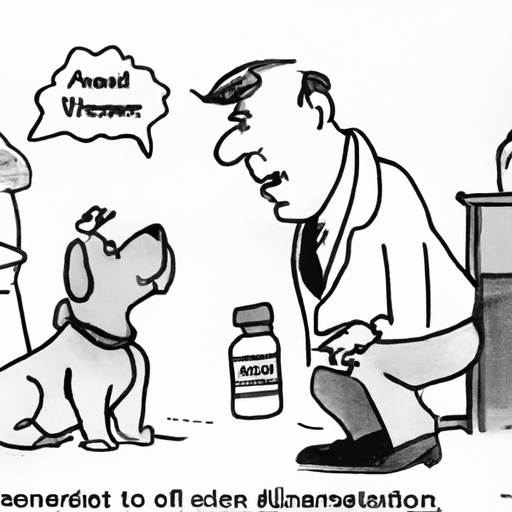When it comes to the health and wellbeing of our canine companions, every pet parent wants to ensure their dog is getting the best care possible. From routine check-ups to specialized treatment, it’s important to understand what medications our pets may be prescribed and why. One such medication is Atenolol, a beta-blocker often prescribed for dogs with certain heart conditions.
Table of Contents
- What is Atenolol?
- Uses of Atenolol in Dogs
- How Atenolol Works
- Potential Side Effects
- Frequently Asked Questions
Key Takeaways
- Atenolol is a beta-blocker used to treat heart conditions in dogs.
- This medication works by slowing the heart rate and reducing the force of heart contractions.
- Side effects can include fatigue, weakness, and gastrointestinal issues.
- Regular check-ups and monitoring are necessary when a dog is on Atenolol.
What is Atenolol?
Atenolol is a type of medication known as a beta-blocker. These drugs are used in both human and veterinary medicine, primarily for the treatment of cardiovascular conditions. They work by blocking certain receptors in the body that respond to stress hormones like adrenaline, thus helping to regulate the heart’s function.
In the world of veterinary medicine, Atenolol is commonly prescribed for dogs with conditions such as hypertrophic cardiomyopathy, arrhythmia, and hypertension. This medication can be a lifesaver for dogs with these conditions, helping to manage symptoms and improve overall quality of life. PetMD has an excellent article that further explains the uses and benefits of Atenolol in dogs.
Uses of Atenolol in Dogs
The primary use of Atenolol in dogs is to treat heart conditions. Here are some of the specific conditions and situations where Atenolol might be used:
- Hypertrophic Cardiomyopathy: This condition, which involves an abnormal thickening of the heart muscle, can cause a variety of symptoms in dogs, including fatigue, weakness, and difficulty breathing. Atenolol can help manage these symptoms by reducing the heart’s workload.
- Arrhythmias: Irregular heart rhythms, or arrhythmias, can be potentially dangerous for dogs. Atenolol can help regulate the heart’s rhythm, reducing the risk of complications.
- Hypertension: High blood pressure, or hypertension, can lead to a variety of health problems for dogs. By reducing the force of the heart’s contractions, Atenolol can help lower blood pressure.
As a pet caregiver, it’s important to understand these conditions and the role Atenolol plays in their treatment. For further reading on how to care for a dog with heart conditions, this article from One Top Dog is a great resource.
How Atenolol Works
As a beta-blocker, Atenolol works by blocking the action of certain stress hormones on the heart. This has two primary effects:
- It slows the heart rate, reducing the number of contractions per minute.
- It reduces the force of each contraction, lowering the overall workload of the heart.
This dual action helps to regulate the heart’s function, making it easier for dogs with heart conditions to lead normal, active lives. This One Top Dog article provides more tips on how to keep your dog healthy, even when dealing with heart conditions.
Potential Side Effects
While Atenolol can be very beneficial for dogs with heart conditions, it’s also important to be aware of potential side effects. These can include:
- Fatigue: Since Atenolol slows the heart rate, it can sometimes lead to increased tiredness or lethargy.
- Weakness: Some dogs may experience muscle weakness while on Atenolol.
- Gastrointestinal issues: Nausea, vomiting, and diarrhea are also potential side effects of this medication.
As with any medication, it’s important to monitor your dog closely for any adverse reactions. Regular check-ups with your veterinarian are crucial to ensure the medication is working properly and not causing any harmful effects. On One Top Dog, you can find more information on how to decide when it’s time to visit the vet.
Frequently Asked Questions
1. How long does it take for Atenolol to work in dogs?
Atenolol begins to work soon after it’s administered, but the effects may not be noticeable for one to two weeks.
2. Can I stop giving my dog Atenolol if he seems better?
No. Atenolol is a medication that needs to be taken consistently as prescribed by your vet. Suddenly stopping it can cause serious health issues.
3. What should I do if I miss a dose?
If you miss a dose, give it as soon as you remember. If it’s close to the next dose, skip the missed dose and return to the regular schedule.
In conclusion, Atenolol is a powerful medication that can greatly enhance the quality of life for dogs with certain heart conditions. As a caring and responsible pet parent, your understanding and management of their medication can make a world of difference in their health and happiness.



